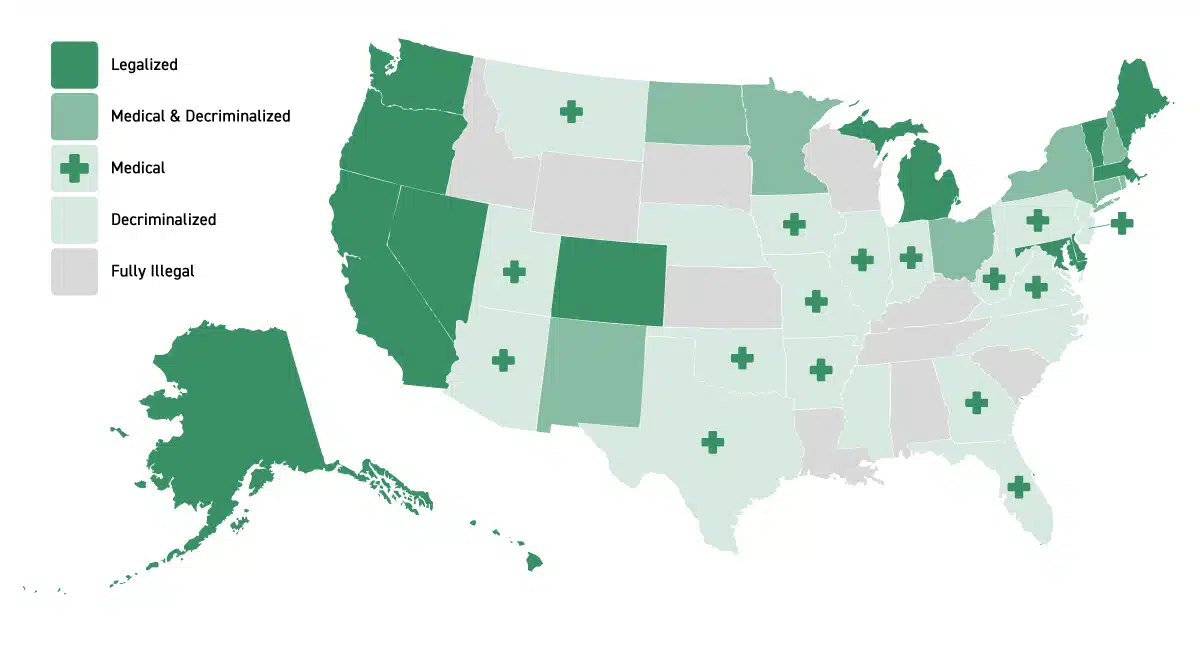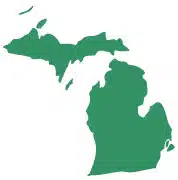Every day brings new questions about the legality of marijuana in different states — the drug remains a schedule 1 substance at the federal level, but 11 states have made weed fully legal, and another 22 allow it for medical usage. So it figures that, with the legal status of cannabis in flux, the regulations regarding cannabis advertising change all the time.
It can be difficult to stay up to date on regulations, especially for boutique dispensaries just getting into the business that want to spread the word about their product but aren’t sure how to get started or where to even look for guidelines.
We have you covered. We’ve put together this guide on marijuana advertising laws, which we’ll update regularly to ensure you have the latest information. Still have questions? You always can contact us to ask.

Who Determines What’s Legal for Marijuana Marketing?
State regulators generally determine laws regarding cannabis advertising. However, not every state has set up such laws. The rate of legalization is outpacing many states’ preparedness — they may not have addressed any questions of advertising legality, which means policies will be set via individual case precedent.
For instance, after a billboard in Maryland depicted Michelangelo’s Adam smoking a jay, state legislators enacted new standards for pot advertising. Up until then, it was relatively unregulated.
What Regulations Have States Placed on Marijuana Advertising?
Many states model their marijuana advertising laws after already-existing ones governing alcohol advertising. One major consideration is exposing kids to advertisements for controlled substances, including marijuana.
When Colorado became the first state to legalize marijuana for recreational usage in 2014, the state stuck with a guideline the alcohol industry has used for self-governing — no advertising on television programs, radio stations, websites or print publications where the audience includes more than 30 percent people under age 21.
What Happens to Advertising That Can Be Viewed Across State Lines?
This is an area the states are still working through. It’s complicated.
Since marijuana is banned at the federal level, you won’t see any national advertising for the substance — i.e., you can’t take out an ad in a national sports publication for cannabis because it would probably get the magazine into a mess with federal regulators.
Other regulations vary according to what states the ads will be seen in. You can buy an ad for a dispensary in many magazines that only target Colorado readers. But you can’t buy one in a magazine that will be distributed across state lines. Colorado law explicitly states cannabis sellers cannot target people out of state.
How about advertising in a state that has not legalized marijuana for a dispensary located in a state where marijuana is legal? This, again, is tricky and will likely come down to a court challenge some day.
A controversial billboard in Connecticut, where recreational pot use is illegal, reminded travelers that in nearby Massachusetts, they can use it legally. Groups protested the billboard, but it wasn’t removed. Some state legislatures are putting such items on their agendas for future sessions — so you can be sure there lobbying dollars will flow there.
Safety Claims Closely Monitored
Whatever type of cannabis advertising you engage in, from online to billboard, there is one regulation that remains consistent no matter what state you choose to advertise in, and that’s regarding safety.
You cannot make false claims about your product’s safety. You cannot imply the product does things it can’t deliver. You cannot mislead people about the effects of marijuana. Every state monitors for these things, and violating such guidelines could lead to fines or being blacklisted by a media company.
Other safety-based regulations in advertising:
- No promoting “over consumption” of marijuana
- No claiming unproven curative effects of the drug
- In some states, posting advertising without a list of possible side effects (i.e., may be habit-forming), much like with tobacco advertising
Will Every Media Property Accept Marijuana Advertising?
No. TV stations, magazines, newspapers, websites and billboard vendors can decide whether they want to accept cannabis advertising dollars.
Rejecting them has not, so far, been proven to violate free speech or any other regulations. So if you try to advertise with a brand whose audience doesn’t quite line up with your target, don’t be surprised to receive a rejection. (The NFL famously refused a cannabis ad for the Super Bowl; the league has strict policies regarding player marijuana usage.)
Individual State Laws for Cannabis Marketing
Colorado, California and Washington are three of the most prolific states to legalize marijuana, and all have posted rules governing its advertising. Here’s the rundown on their current rules, but make sure to check back often, as regulations evolve quickly within new sectors like pot advertising.
What Are Colorado’s Pot Advertising Restrictions?
Since Colorado was first to legalize pot, it remains ground zero for the industry. Many things that happen in Colorado wind up imitated in other states. The Marijuana Enforcement Division of Law Enforcement enacted some

strict limitations on advertising, including:
- No outdoor signage of any kind
- No mobile or otherwise location-based advertising
- No unsolicited internet pop-up ads
- No banners on mass-market websites
- No unsolicited leaflets or handbills
What Are California’s Laws Governing Cannabis Advertising?

California has the largest economy of any state where cannabis has been legalized. It’s attracting a big share of the advertising dollars in the sector, so you should understand the guidelines governing weed marketing in the state. Here’s a rundown on regulations in California, which went into effect in January 2019:
- TV, digital, print and radio ads for marijuana can only run if at least 71.6 percent of the audience is over 21
- Cannabis advertisers cannot include imagery that would attract minors, such as movie or cartoon characters (in other words, SpongeBob can’t be your celebrity spokesperson)
- No giving away freebies or promoting contests tied to cannabis
- Billboards on highways cannot be closer than 15 miles to the border or 15 miles to another state (this is designed to avoid the aforementioned type of controversy seen between Connecticut and Massachusetts)
What Laws Govern Marijuana Advertising in Illinois, Where Pot Is Now Legal?

In 2020, Illinois became the 11th state to legalize recreational usage of marijuana. Adults older than 21 can possess up to 30 grams of weed, and while they can’t grow it at home, people using it for medicinal purposes can. So what does this mean for the state’s marijuana advertising laws?
- No cartoon images or other imagery appealing to minors can be used.
- Ads on public transit and shelters are prohibited.
- You can’t depict marijuana consumption in ads, and you can’t show cannabis buds or leaves, either.
- No ads within 1,000 feet of places that allow or cater to people under 21, such as schools, arcades, playgrounds, libraries or parks.
Louisiana Legalizes Medical Marijuana But Doesn’t Loosen Advertising Restrictions
Louisiana recently passed a law allowing use of medical marijuana to treat any condition, broadening an early law that restricted usage to a smaller list of conditions. But dispensaries that want to get the word out to patients about their wares face restrictive advertising bans, which were not addressed in the new law. Dispensaries can’t advertise their products or provide any public information about their pricing.
Maine Begins Recreational Sale of Cannabis and Issues Reminders on Prohibited Advertising
It took four years since a statewide vote, but Maine finally begins selling recreational weed this fall, prompting the state’s Office of Marijuana Policy to reemphasize the rules regarding pot advertising.
No ads can be aimed at people under 21, which means no advertising near schools. Advertisers must prove any ad buys target an audience over age 21 as well. The only location-based advertising permitted is in mobile apps that can only be downloaded by those over 21. And unsolicited internet ads of any type are banned.
Does Michigan Have a Marijuana Advertising Law Problem?

Michigan legalized recreational use of marijuana last year. The state government has been involved in a tiff with Weedmaps, a site where consumers and pot businesses can connect. Michigan wants Weedmaps to yank ads from sellers who are not licensed in the state. According to Michigan Live, Weedmaps pledged to check on licenses starting in January 2020.
What Are Washington’s Marijuana Advertising Laws?

The Washington State Liquor and Cannabis Board has a comprehensive listing of what’s OK and what’s not in marijuana advertising:
- Hiring agencies to promote videos and using search options like Google Ads is permitted
- No advertising on public transit or in shelters
- No advertising on publicly owned property or within 1,000 feet of places frequented by those under 21, such as schools or playgrounds
- No sign spinners, costumed provocateurs or other people advertising on the streets to bring attention to a business; no inflatable tubes, either
- No wrapped vehicles
- Direct mail is OK as long as you don’t include coupons
- Billboards are allowed, though they cannot use certain words or imagery, such as leaf or joint
What Are New York’s Advertising Laws for Marijuana?

In New York, where medical marijuana is legal but a recent push to fully legalize failed, the state has a series of strict laws governing advertising, including:
- No illuminated outdoor signs for marijuana
- External signs advertising at a business can only be black and white
- All claims must be backed by research/science and no sources can be used out of context
What Laws Regulate CBD Advertising?
Not every state has approved marijuana, for medical or recreational usage, but cannabidiol (CBD), the active ingredient in marijuana that’s found in the hemp plant, has gained legal status in many states. A 2018 federal bill legalized CBD with low forms of the psychoactive delta-9-tetrahydrocannabinol. So what regulations govern CBD sales? This area may be even grayer than marijuana, since there are so many ways CBD is sold, from gummies to oil. Here are a few things you should keep an eye on:
- The U.S. Food and Drug Administration has issued warnings to manufacturers selling CBD who claim unproven curative powers
- A number of digital giants, including Reddit, Pinterest, Twitch, Twitter, Amazon and Google, don’t allow CBD ads
- Creative out-of-home may work best—for instance, Koi, which sells CBD gummies and juices, has a branded RV trailer driving cross country
- Billboards are likely legal as long as the CBD oil comes from hemp, but check out state regulations just in case
- Ads cannot show people consuming CBD
Marijuana Advertising Laws in Mexico
South of the border, the Mexican government recently passed draft regulations for the regulation of cannabis (there’s a mouthful). The new guidelines say medical weed can only be marketed to health professionals. Advertising and promotion to the public are illegal.
Keep Up With the Latest on Cannabis Advertising
Marijuana regulations governing cannabis marketing will change and evolve as the marketplace grows and more states approve it for recreational usage. Stay informed by checking back with us periodically for the latest updates.


this is really helpful – it’s really hard to find the state laws all in one article, so thank you and please keep this up to date!
Hi, the picture graph of the legalization status of the US is wrong. Florida and Georgia are medicinal only, they have not legalized cannabis for recreational use. Other than that, thank you. Theres some great info on this site.
Hello! I work with a magazine in Denver, CO and we are considering adding a cannabis dispensary to our list of businesses who advertise with us. We have a guideline requiring we must provide a 71:31 statement declaring 71% of our readership is over 21. Do you have any examples of these letters? Or do you know where I can find more info on this subject? I appreciate your help!
I wanted to express my sincere appreciation for the valuable information provided in your blog post about marijuana advertising laws. Thank you for sharing such a well-written and informative piece!
I found this article on marijuana advertising laws to be incredibly informative and timely. With the changing legal landscape around cannabis in various parts of the world, understanding the regulations that govern its advertising is crucial for both businesses and consumers.